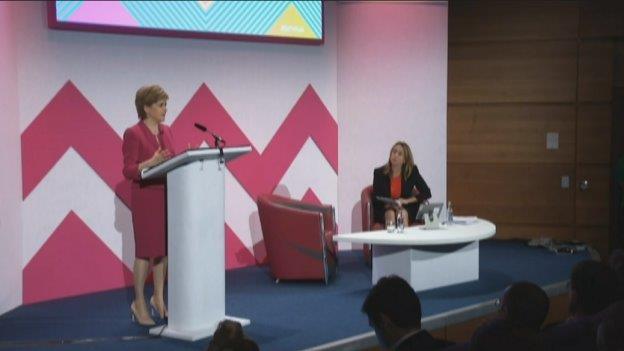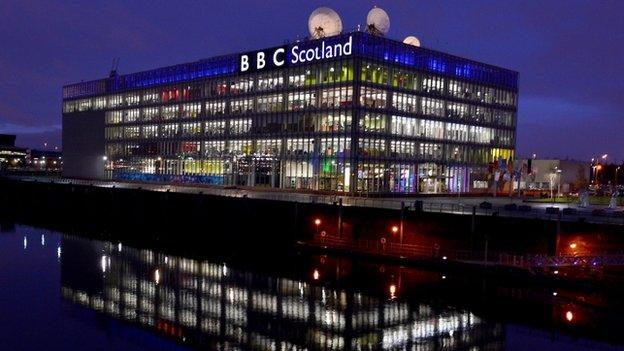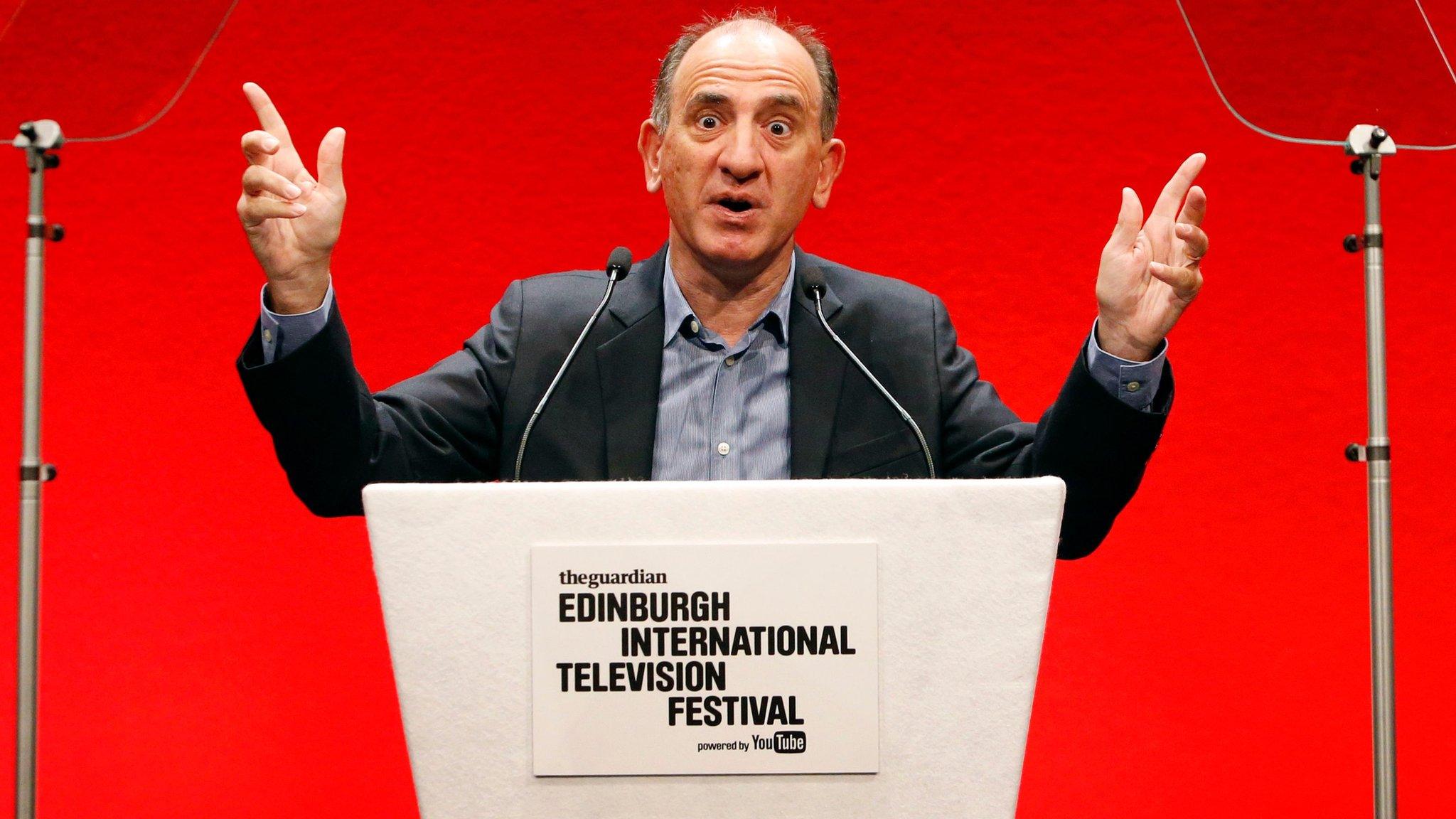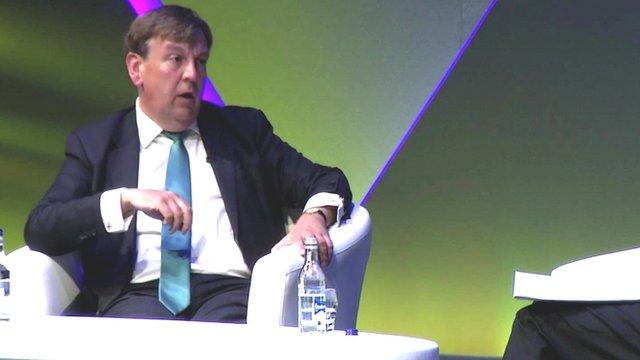Nicola Sturgeon calls for greatly enhanced BBC Scotland
- Published
- comments

Nicola Sturgeon called for "bold and ambitious" reforms of how the BBC is structured
The Scottish first minister has called for the BBC to greatly enhance its presence in Scotland.
In a speech at the Edinburgh Television Festival, external, Nicola Sturgeon said BBC Scotland should be given more influence and a greater slice of the licence fee.
And she called for a new BBC Scotland TV channel to be created alongside a second English-language radio station.
Ms Sturgeon also said the corporation had not been institutionally biased during the independence referendum.
But she said there had been "occasions when its coverage - through oversight, apparent ignorance of the detail of an issue or as a result of simply following the agenda of openly partisan print media - lapsed from the objective output the referendum deserved into what could seem partial and, at times, pejorative."
Federal structure
The first minister argued that the old model of public broadcasting no longer reflected the "varied and rich political and social realities of the UK", and that the BBC Charter renewal process presented an opportunity for bold change.
The BBC is expected to publish its own proposals for Charter renewal in the next fortnight. The next Charter will form the basis for BBC operations over the next decade.
Speaking as she became the first politician to deliver the Alternative MacTaggart Lecture, Ms Sturgeon called for the BBC to adopt a federal structure, with a separate board for each home nation under a UK-wide board.
And she repeated the SNP's calls for broadcasting in Scotland to be devolved from Westminster to the Scottish Parliament, but stressed it was "vital" that the BBC continued to have editorial independence.

Ms Sturgeon's SNP believes BBC Scotland should get a far greater slice of the licence fee than is currently the case
Ms Sturgeon said that a new and distinct BBC Scotland TV channel would be the best way of ensuring a "wider, richer" range of content was available to viewers in Scotland.
She added: "Radio Scotland currently has an almost impossible job - it's one station trying to reflect the life of an entire nation. And it does it well.
"But a second English-language radio service would provide a greater variety of programmes. And because the two channels could specialise more than Radio Scotland does, they would have stronger and more distinct identities."
Ms Sturgeon argued that the UK had changed dramatically since devolution, but broadcasters were still catching up with its consequences.
And although that posed questions for all public service broadcasters, the issue was perhaps most acute with the BBC, she said.
The first minister added: "Scotland, the BBC and all the nations and regions of the UK have the right to expect something truly radical from the charter review. A tight financial settlement cannot be a reason not to do things differently.
"A BBC that puts forward a bold proposal for Scotland, for the nations and regions, and for the UK, will have in us a strong and willing ally. A BBC that offers piecemeal solutions will fail to meet the demands or restore the trust of Scottish audiences."
'Smaller audiences'
Ms Sturgeon's SNP won 56 out of the 59 seats in Scotland in May's election. Its manifesto argued Scotland should receive an extra £100m in BBC funding to "more accurately reflect licence fee revenue raised in Scotland".
The BBC said it recognised a demand for greater representation and portrayal of Scottish audiences on BBC services.
A spokesman said: "Audiences across Scotland get great value from the licence fee, and are some of the highest users of BBC services.
"The licence fee funds much loved services across the UK - like BBC One and Radio Two - but also specific services like Radio Scotland and BBC Alba. Services for smaller audiences clearly cost more to provide, and that is why we spend more in the nations per head than the rest of the UK.
"We look forward to working with the Scottish government on these issues, and to consulting with licence fee payers in Scotland about how they would like to see their licence fee spent."
Ms Sturgeon's speech was heavily criticised by opposition parties.
Liz Smith, culture spokeswoman for the Scottish Conservatives said: "Instead of focusing on much-loved programmes like Strictly or Eastenders, the SNP's vision for the BBC is for millions of pounds of licence fee funds to be diverted to pay for as yet unspecified programmes which accord with the SNP's national story."
Liberal Democrat leader Willie Rennie said: "Apart from the conspiracy theorists in the SNP, people value the broadcaster which is seen as an oracle of impartiality across the world."
Scottish Labour's democracy spokeswoman, Claire Baker, said: "If we want to be truly bold and radical then we need to look at the challenges facing the BBC in the years ahead.
"This is not the creation of new 'Scottish only' stations but rather how BBC content is viewed and shared and how the corporation stays relevant in a time of smartphones, streaming and social media."
- Published26 August 2015

- Published26 August 2015
